GSM London FELM4026 Financial and Economic Literacy for Managers
VerifiedAdded on 2021/03/10
|20
|3697
|49
Homework Assignment
AI Summary
This document is a comprehensive module handbook for Financial and Economic Literacy for Managers (FELM4026) at GSM London. It outlines the module's aims, which are to introduce students to how government policies, monetary policy, financial markets, and financial information influence business management and decision-making. The handbook details learning outcomes, the class schedule, and the learning activities, including lectures, tutorials, and guided independent study. It also provides a list of key textbooks, recommended websites, and assessment details, which consists of one coursework assignment worth 100% of the module grade. The handbook emphasizes the importance of attendance, active participation, and academic integrity, including guidelines on academic misconduct and referencing. It also provides contact information for support services and resources available to students.
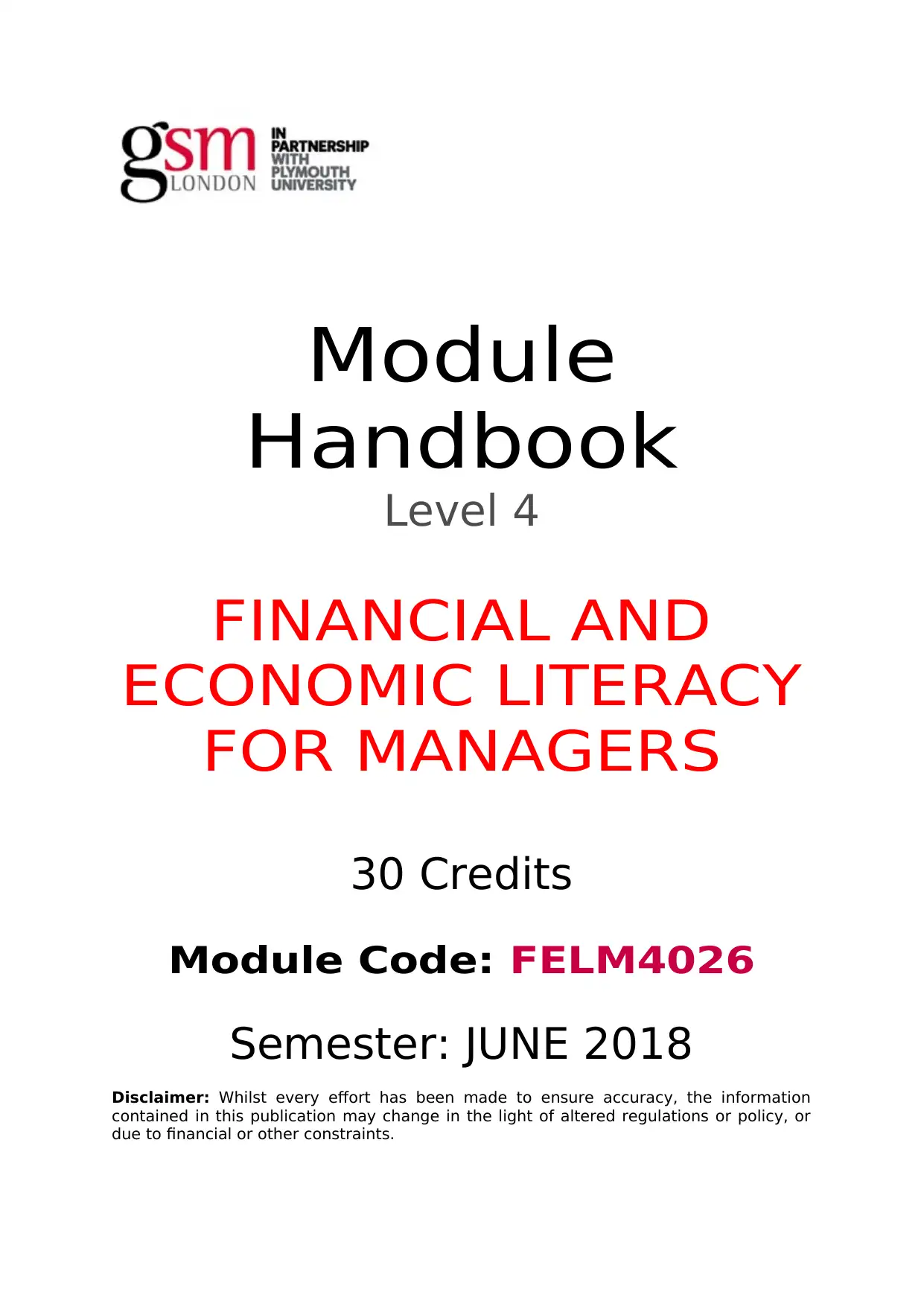
Module
Handbook
Level 4
FINANCIAL AND
ECONOMIC LITERACY
FOR MANAGERS
30 Credits
Module Code: FELM4026
Semester: JUNE 2018
Disclaimer: Whilst every effort has been made to ensure accuracy, the information
contained in this publication may change in the light of altered regulations or policy, or
due to financial or other constraints.
Handbook
Level 4
FINANCIAL AND
ECONOMIC LITERACY
FOR MANAGERS
30 Credits
Module Code: FELM4026
Semester: JUNE 2018
Disclaimer: Whilst every effort has been made to ensure accuracy, the information
contained in this publication may change in the light of altered regulations or policy, or
due to financial or other constraints.
Paraphrase This Document
Need a fresh take? Get an instant paraphrase of this document with our AI Paraphraser

Note: This document concerns the structure and content of the module. If you would
like any other advice, please consult the Student Hub via student.hub@gsm.org.uk
Module Handbook Page 2
February 2018 Semester
like any other advice, please consult the Student Hub via student.hub@gsm.org.uk
Module Handbook Page 2
February 2018 Semester
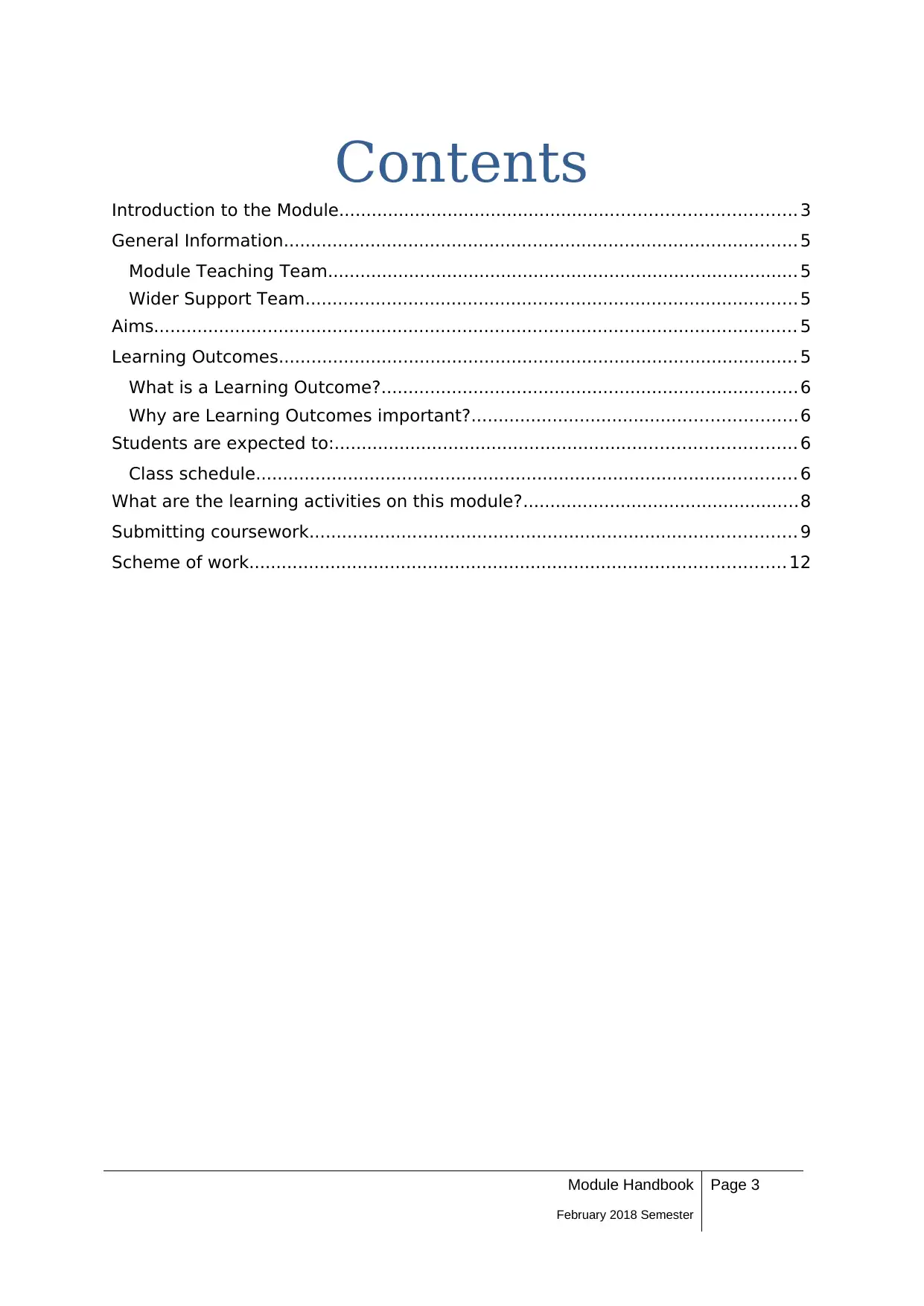
Contents
Introduction to the Module.................................................................................... 3
General Information............................................................................................... 5
Module Teaching Team....................................................................................... 5
Wider Support Team........................................................................................... 5
Aims....................................................................................................................... 5
Learning Outcomes................................................................................................ 5
What is a Learning Outcome?.............................................................................6
Why are Learning Outcomes important?............................................................6
Students are expected to:..................................................................................... 6
Class schedule.................................................................................................... 6
What are the learning activities on this module?...................................................8
Submitting coursework.......................................................................................... 9
Scheme of work................................................................................................... 12
Module Handbook Page 3
February 2018 Semester
Introduction to the Module.................................................................................... 3
General Information............................................................................................... 5
Module Teaching Team....................................................................................... 5
Wider Support Team........................................................................................... 5
Aims....................................................................................................................... 5
Learning Outcomes................................................................................................ 5
What is a Learning Outcome?.............................................................................6
Why are Learning Outcomes important?............................................................6
Students are expected to:..................................................................................... 6
Class schedule.................................................................................................... 6
What are the learning activities on this module?...................................................8
Submitting coursework.......................................................................................... 9
Scheme of work................................................................................................... 12
Module Handbook Page 3
February 2018 Semester
⊘ This is a preview!⊘
Do you want full access?
Subscribe today to unlock all pages.

Trusted by 1+ million students worldwide

Module Handbook Page 4
February 2018 Semester
February 2018 Semester
Paraphrase This Document
Need a fresh take? Get an instant paraphrase of this document with our AI Paraphraser
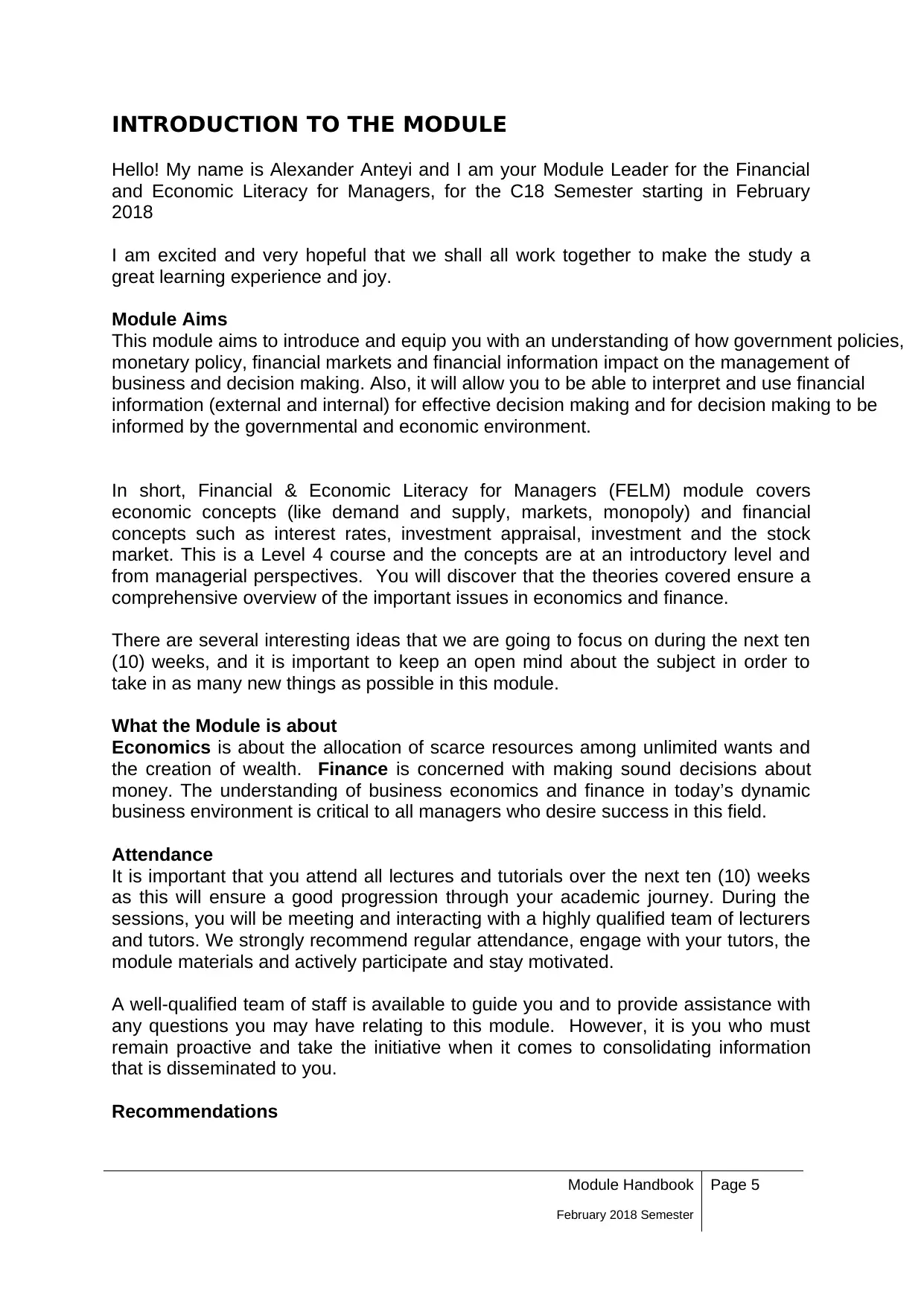
INTRODUCTION TO THE MODULE
Hello! My name is Alexander Anteyi and I am your Module Leader for the Financial
and Economic Literacy for Managers, for the C18 Semester starting in February
2018
I am excited and very hopeful that we shall all work together to make the study a
great learning experience and joy.
Module Aims
This module aims to introduce and equip you with an understanding of how government policies,
monetary policy, financial markets and financial information impact on the management of
business and decision making. Also, it will allow you to be able to interpret and use financial
information (external and internal) for effective decision making and for decision making to be
informed by the governmental and economic environment.
In short, Financial & Economic Literacy for Managers (FELM) module covers
economic concepts (like demand and supply, markets, monopoly) and financial
concepts such as interest rates, investment appraisal, investment and the stock
market. This is a Level 4 course and the concepts are at an introductory level and
from managerial perspectives. You will discover that the theories covered ensure a
comprehensive overview of the important issues in economics and finance.
There are several interesting ideas that we are going to focus on during the next ten
(10) weeks, and it is important to keep an open mind about the subject in order to
take in as many new things as possible in this module.
What the Module is about
Economics is about the allocation of scarce resources among unlimited wants and
the creation of wealth. Finance is concerned with making sound decisions about
money. The understanding of business economics and finance in today’s dynamic
business environment is critical to all managers who desire success in this field.
Attendance
It is important that you attend all lectures and tutorials over the next ten (10) weeks
as this will ensure a good progression through your academic journey. During the
sessions, you will be meeting and interacting with a highly qualified team of lecturers
and tutors. We strongly recommend regular attendance, engage with your tutors, the
module materials and actively participate and stay motivated.
A well-qualified team of staff is available to guide you and to provide assistance with
any questions you may have relating to this module. However, it is you who must
remain proactive and take the initiative when it comes to consolidating information
that is disseminated to you.
Recommendations
Module Handbook Page 5
February 2018 Semester
Hello! My name is Alexander Anteyi and I am your Module Leader for the Financial
and Economic Literacy for Managers, for the C18 Semester starting in February
2018
I am excited and very hopeful that we shall all work together to make the study a
great learning experience and joy.
Module Aims
This module aims to introduce and equip you with an understanding of how government policies,
monetary policy, financial markets and financial information impact on the management of
business and decision making. Also, it will allow you to be able to interpret and use financial
information (external and internal) for effective decision making and for decision making to be
informed by the governmental and economic environment.
In short, Financial & Economic Literacy for Managers (FELM) module covers
economic concepts (like demand and supply, markets, monopoly) and financial
concepts such as interest rates, investment appraisal, investment and the stock
market. This is a Level 4 course and the concepts are at an introductory level and
from managerial perspectives. You will discover that the theories covered ensure a
comprehensive overview of the important issues in economics and finance.
There are several interesting ideas that we are going to focus on during the next ten
(10) weeks, and it is important to keep an open mind about the subject in order to
take in as many new things as possible in this module.
What the Module is about
Economics is about the allocation of scarce resources among unlimited wants and
the creation of wealth. Finance is concerned with making sound decisions about
money. The understanding of business economics and finance in today’s dynamic
business environment is critical to all managers who desire success in this field.
Attendance
It is important that you attend all lectures and tutorials over the next ten (10) weeks
as this will ensure a good progression through your academic journey. During the
sessions, you will be meeting and interacting with a highly qualified team of lecturers
and tutors. We strongly recommend regular attendance, engage with your tutors, the
module materials and actively participate and stay motivated.
A well-qualified team of staff is available to guide you and to provide assistance with
any questions you may have relating to this module. However, it is you who must
remain proactive and take the initiative when it comes to consolidating information
that is disseminated to you.
Recommendations
Module Handbook Page 5
February 2018 Semester

I strongly recommend your active and full participation in class and independent
learning throughout the session. Seek for advice and support early in the course. Let
us make learning a fun and joy. I am very certain that you will enjoy this journey as
there is room for all. We (You + GSM + Tutors) are all partners desiring academic
success
Alexander Anteyi
Module Handbook Page 6
February 2018 Semester
learning throughout the session. Seek for advice and support early in the course. Let
us make learning a fun and joy. I am very certain that you will enjoy this journey as
there is room for all. We (You + GSM + Tutors) are all partners desiring academic
success
Alexander Anteyi
Module Handbook Page 6
February 2018 Semester
⊘ This is a preview!⊘
Do you want full access?
Subscribe today to unlock all pages.

Trusted by 1+ million students worldwide
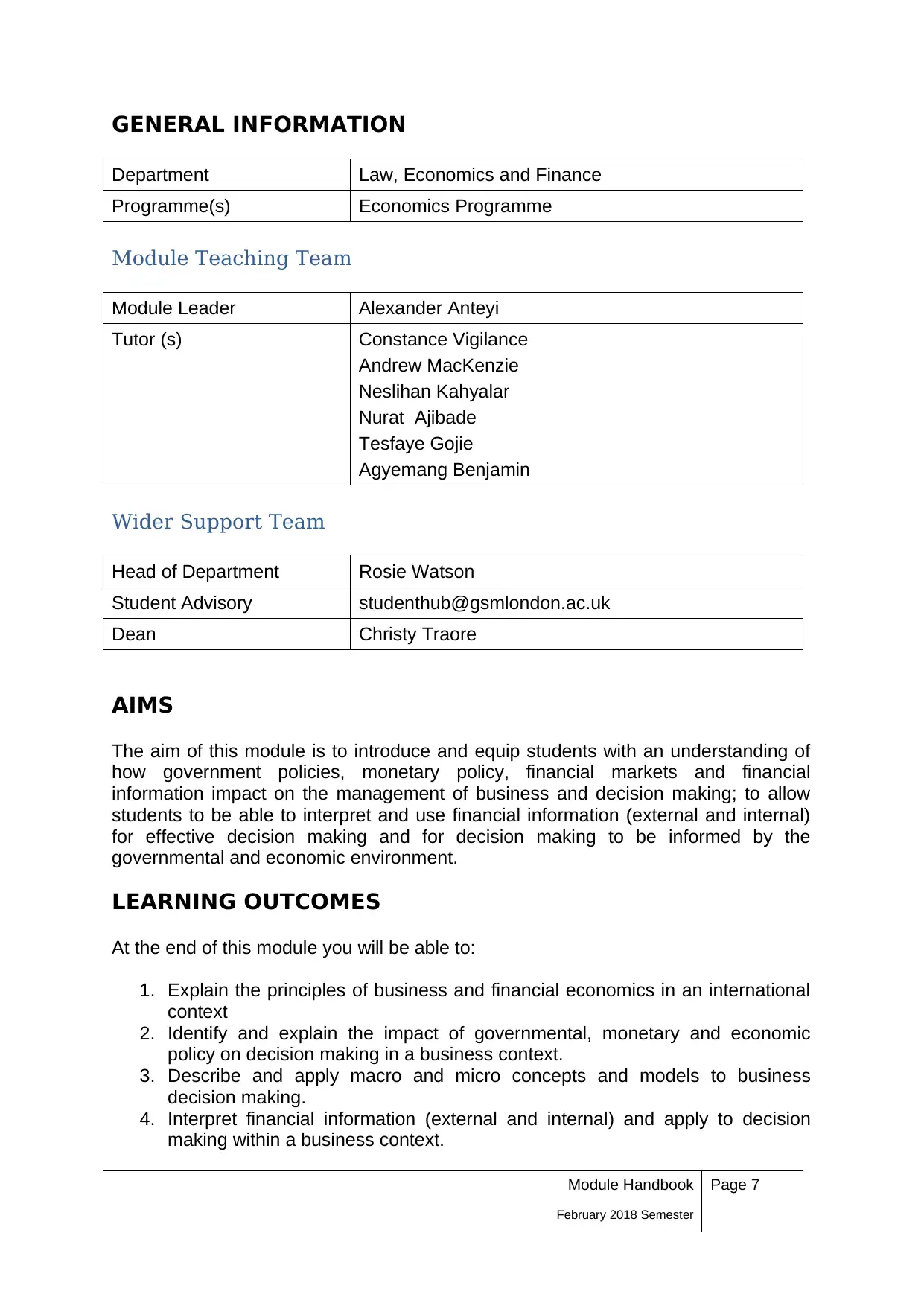
GENERAL INFORMATION
Department Law, Economics and Finance
Programme(s) Economics Programme
Module Teaching Team
Module Leader Alexander Anteyi
Tutor (s) Constance Vigilance
Andrew MacKenzie
Neslihan Kahyalar
Nurat Ajibade
Tesfaye Gojie
Agyemang Benjamin
Wider Support Team
Head of Department Rosie Watson
Student Advisory studenthub@gsmlondon.ac.uk
Dean Christy Traore
AIMS
The aim of this module is to introduce and equip students with an understanding of
how government policies, monetary policy, financial markets and financial
information impact on the management of business and decision making; to allow
students to be able to interpret and use financial information (external and internal)
for effective decision making and for decision making to be informed by the
governmental and economic environment.
LEARNING OUTCOMES
At the end of this module you will be able to:
1. Explain the principles of business and financial economics in an international
context
2. Identify and explain the impact of governmental, monetary and economic
policy on decision making in a business context.
3. Describe and apply macro and micro concepts and models to business
decision making.
4. Interpret financial information (external and internal) and apply to decision
making within a business context.
Module Handbook Page 7
February 2018 Semester
Department Law, Economics and Finance
Programme(s) Economics Programme
Module Teaching Team
Module Leader Alexander Anteyi
Tutor (s) Constance Vigilance
Andrew MacKenzie
Neslihan Kahyalar
Nurat Ajibade
Tesfaye Gojie
Agyemang Benjamin
Wider Support Team
Head of Department Rosie Watson
Student Advisory studenthub@gsmlondon.ac.uk
Dean Christy Traore
AIMS
The aim of this module is to introduce and equip students with an understanding of
how government policies, monetary policy, financial markets and financial
information impact on the management of business and decision making; to allow
students to be able to interpret and use financial information (external and internal)
for effective decision making and for decision making to be informed by the
governmental and economic environment.
LEARNING OUTCOMES
At the end of this module you will be able to:
1. Explain the principles of business and financial economics in an international
context
2. Identify and explain the impact of governmental, monetary and economic
policy on decision making in a business context.
3. Describe and apply macro and micro concepts and models to business
decision making.
4. Interpret financial information (external and internal) and apply to decision
making within a business context.
Module Handbook Page 7
February 2018 Semester
Paraphrase This Document
Need a fresh take? Get an instant paraphrase of this document with our AI Paraphraser
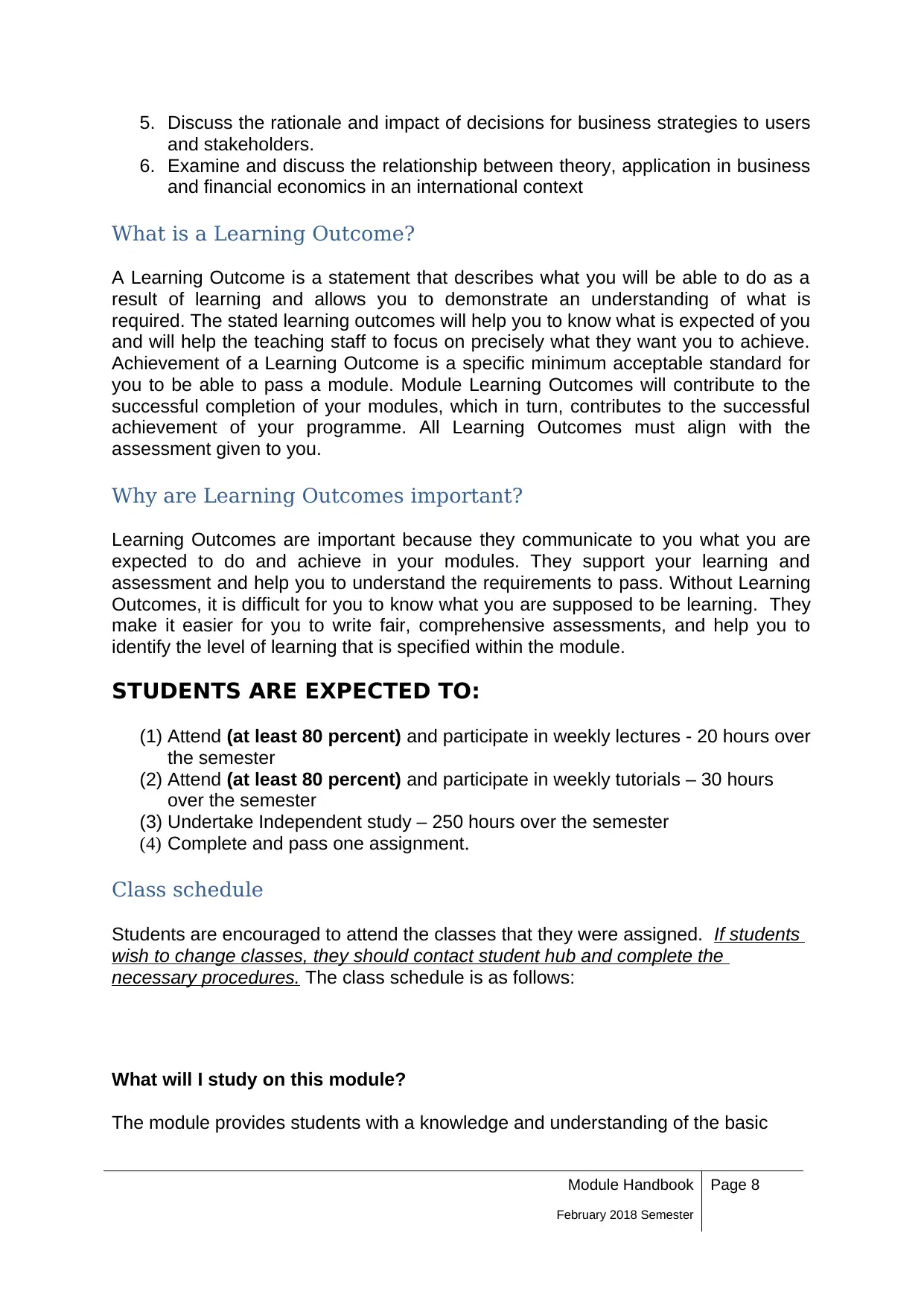
5. Discuss the rationale and impact of decisions for business strategies to users
and stakeholders.
6. Examine and discuss the relationship between theory, application in business
and financial economics in an international context
What is a Learning Outcome?
A Learning Outcome is a statement that describes what you will be able to do as a
result of learning and allows you to demonstrate an understanding of what is
required. The stated learning outcomes will help you to know what is expected of you
and will help the teaching staff to focus on precisely what they want you to achieve.
Achievement of a Learning Outcome is a specific minimum acceptable standard for
you to be able to pass a module. Module Learning Outcomes will contribute to the
successful completion of your modules, which in turn, contributes to the successful
achievement of your programme. All Learning Outcomes must align with the
assessment given to you.
Why are Learning Outcomes important?
Learning Outcomes are important because they communicate to you what you are
expected to do and achieve in your modules. They support your learning and
assessment and help you to understand the requirements to pass. Without Learning
Outcomes, it is difficult for you to know what you are supposed to be learning. They
make it easier for you to write fair, comprehensive assessments, and help you to
identify the level of learning that is specified within the module.
STUDENTS ARE EXPECTED TO:
(1) Attend (at least 80 percent) and participate in weekly lectures - 20 hours over
the semester
(2) Attend (at least 80 percent) and participate in weekly tutorials – 30 hours
over the semester
(3) Undertake Independent study – 250 hours over the semester
(4) Complete and pass one assignment.
Class schedule
Students are encouraged to attend the classes that they were assigned. If students
wish to change classes, they should contact student hub and complete the
necessary procedures. The class schedule is as follows:
What will I study on this module?
The module provides students with a knowledge and understanding of the basic
Module Handbook Page 8
February 2018 Semester
and stakeholders.
6. Examine and discuss the relationship between theory, application in business
and financial economics in an international context
What is a Learning Outcome?
A Learning Outcome is a statement that describes what you will be able to do as a
result of learning and allows you to demonstrate an understanding of what is
required. The stated learning outcomes will help you to know what is expected of you
and will help the teaching staff to focus on precisely what they want you to achieve.
Achievement of a Learning Outcome is a specific minimum acceptable standard for
you to be able to pass a module. Module Learning Outcomes will contribute to the
successful completion of your modules, which in turn, contributes to the successful
achievement of your programme. All Learning Outcomes must align with the
assessment given to you.
Why are Learning Outcomes important?
Learning Outcomes are important because they communicate to you what you are
expected to do and achieve in your modules. They support your learning and
assessment and help you to understand the requirements to pass. Without Learning
Outcomes, it is difficult for you to know what you are supposed to be learning. They
make it easier for you to write fair, comprehensive assessments, and help you to
identify the level of learning that is specified within the module.
STUDENTS ARE EXPECTED TO:
(1) Attend (at least 80 percent) and participate in weekly lectures - 20 hours over
the semester
(2) Attend (at least 80 percent) and participate in weekly tutorials – 30 hours
over the semester
(3) Undertake Independent study – 250 hours over the semester
(4) Complete and pass one assignment.
Class schedule
Students are encouraged to attend the classes that they were assigned. If students
wish to change classes, they should contact student hub and complete the
necessary procedures. The class schedule is as follows:
What will I study on this module?
The module provides students with a knowledge and understanding of the basic
Module Handbook Page 8
February 2018 Semester
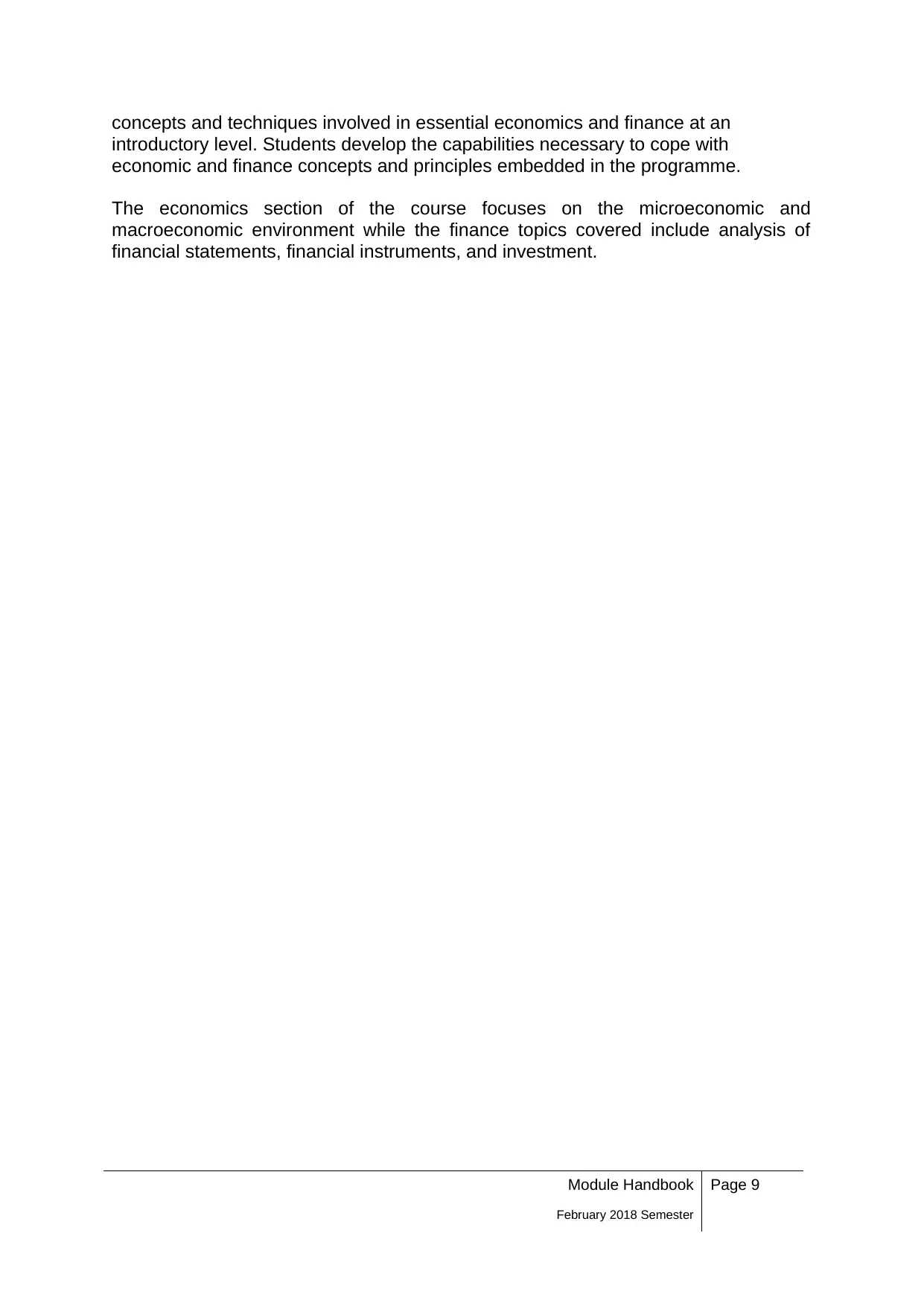
concepts and techniques involved in essential economics and finance at an
introductory level. Students develop the capabilities necessary to cope with
economic and finance concepts and principles embedded in the programme.
The economics section of the course focuses on the microeconomic and
macroeconomic environment while the finance topics covered include analysis of
financial statements, financial instruments, and investment.
Module Handbook Page 9
February 2018 Semester
introductory level. Students develop the capabilities necessary to cope with
economic and finance concepts and principles embedded in the programme.
The economics section of the course focuses on the microeconomic and
macroeconomic environment while the finance topics covered include analysis of
financial statements, financial instruments, and investment.
Module Handbook Page 9
February 2018 Semester
⊘ This is a preview!⊘
Do you want full access?
Subscribe today to unlock all pages.

Trusted by 1+ million students worldwide
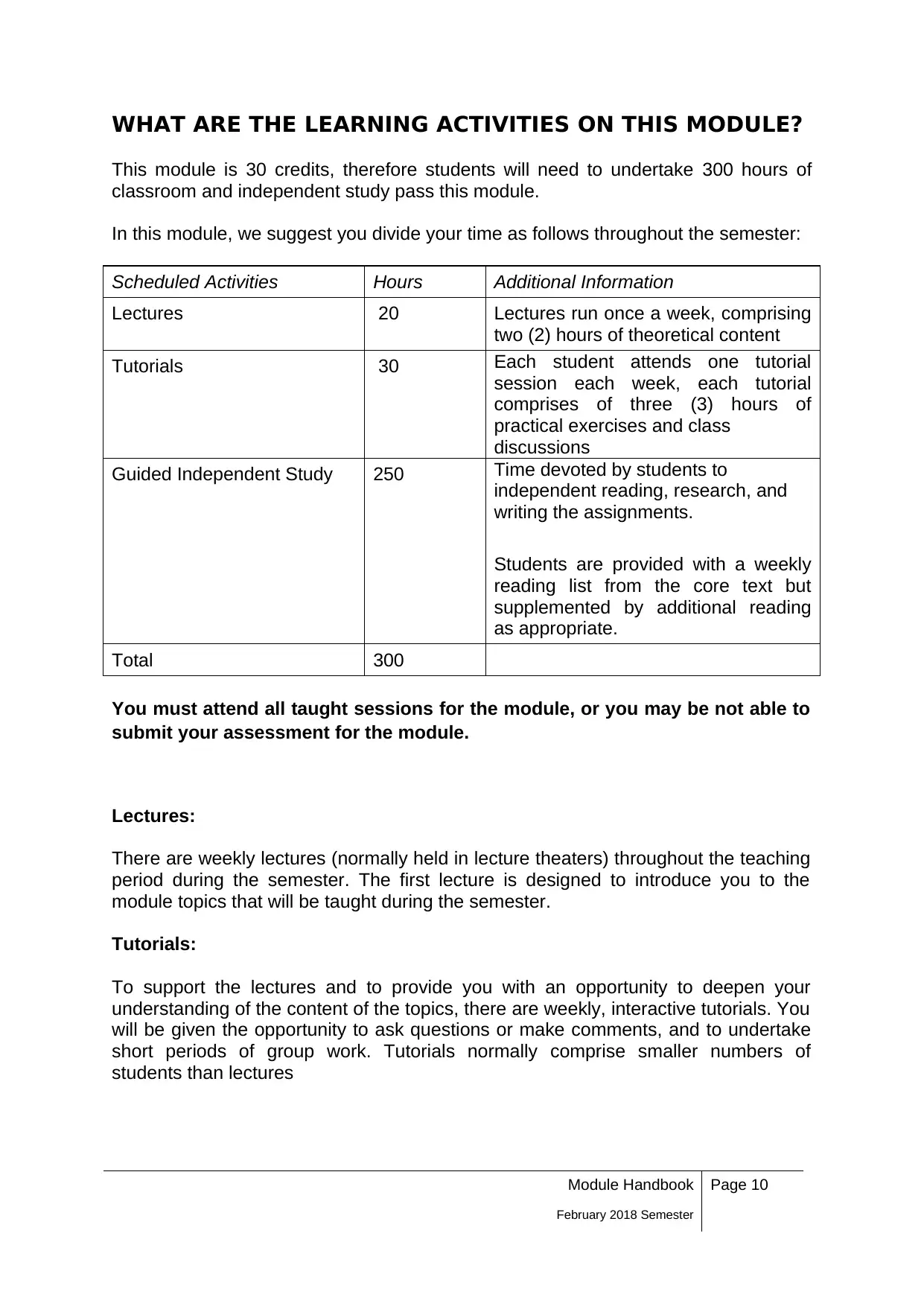
WHAT ARE THE LEARNING ACTIVITIES ON THIS MODULE?
This module is 30 credits, therefore students will need to undertake 300 hours of
classroom and independent study pass this module.
In this module, we suggest you divide your time as follows throughout the semester:
Scheduled Activities Hours Additional Information
Lectures 20 Lectures run once a week, comprising
two (2) hours of theoretical content
Tutorials 30 Each student attends one tutorial
session each week, each tutorial
comprises of three (3) hours of
practical exercises and class
discussions
Guided Independent Study 250 Time devoted by students to
independent reading, research, and
writing the assignments.
Students are provided with a weekly
reading list from the core text but
supplemented by additional reading
as appropriate.
Total 300
You must attend all taught sessions for the module, or you may be not able to
submit your assessment for the module.
Lectures:
There are weekly lectures (normally held in lecture theaters) throughout the teaching
period during the semester. The first lecture is designed to introduce you to the
module topics that will be taught during the semester.
Tutorials:
To support the lectures and to provide you with an opportunity to deepen your
understanding of the content of the topics, there are weekly, interactive tutorials. You
will be given the opportunity to ask questions or make comments, and to undertake
short periods of group work. Tutorials normally comprise smaller numbers of
students than lectures
Module Handbook Page 10
February 2018 Semester
This module is 30 credits, therefore students will need to undertake 300 hours of
classroom and independent study pass this module.
In this module, we suggest you divide your time as follows throughout the semester:
Scheduled Activities Hours Additional Information
Lectures 20 Lectures run once a week, comprising
two (2) hours of theoretical content
Tutorials 30 Each student attends one tutorial
session each week, each tutorial
comprises of three (3) hours of
practical exercises and class
discussions
Guided Independent Study 250 Time devoted by students to
independent reading, research, and
writing the assignments.
Students are provided with a weekly
reading list from the core text but
supplemented by additional reading
as appropriate.
Total 300
You must attend all taught sessions for the module, or you may be not able to
submit your assessment for the module.
Lectures:
There are weekly lectures (normally held in lecture theaters) throughout the teaching
period during the semester. The first lecture is designed to introduce you to the
module topics that will be taught during the semester.
Tutorials:
To support the lectures and to provide you with an opportunity to deepen your
understanding of the content of the topics, there are weekly, interactive tutorials. You
will be given the opportunity to ask questions or make comments, and to undertake
short periods of group work. Tutorials normally comprise smaller numbers of
students than lectures
Module Handbook Page 10
February 2018 Semester
Paraphrase This Document
Need a fresh take? Get an instant paraphrase of this document with our AI Paraphraser
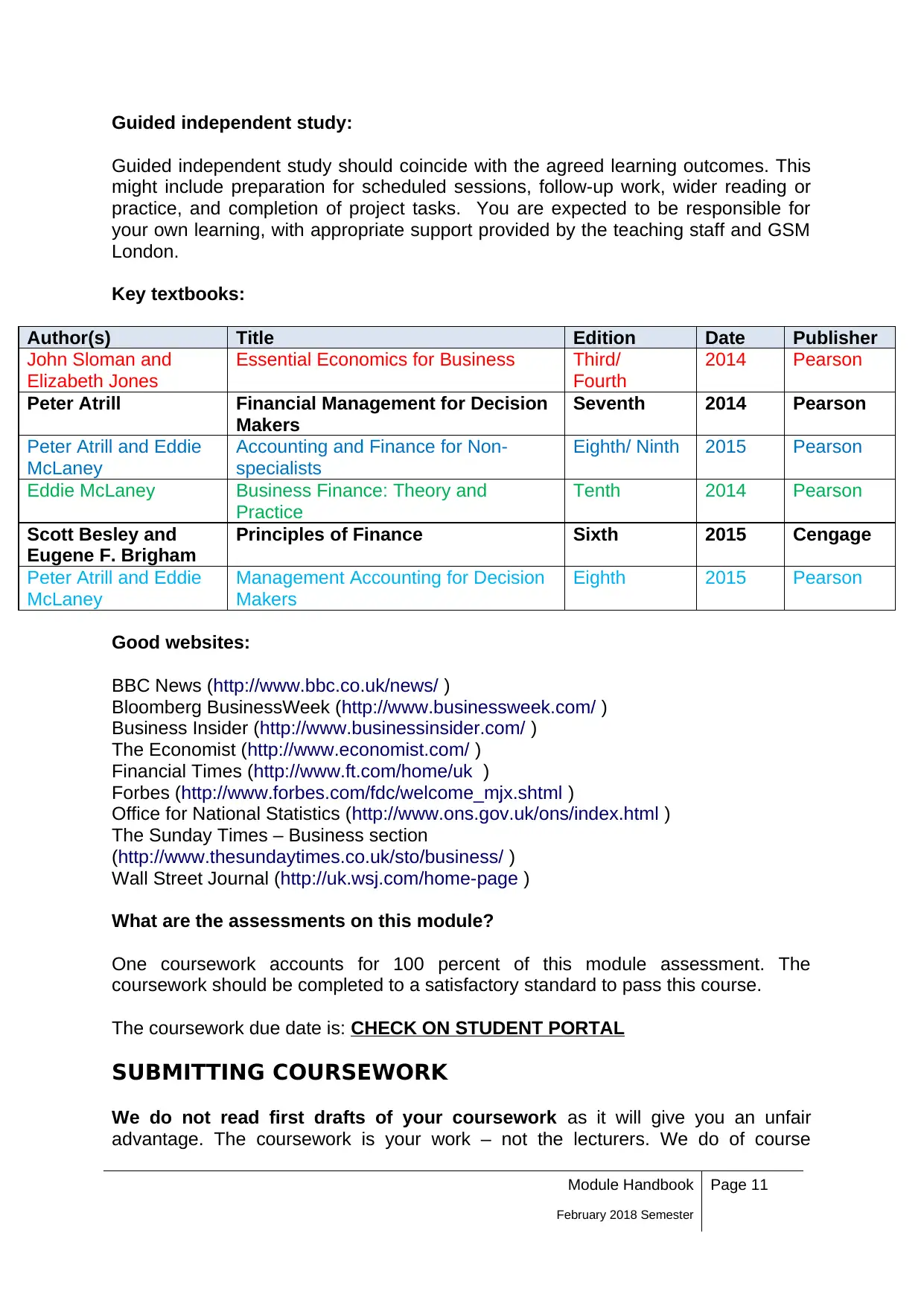
Guided independent study:
Guided independent study should coincide with the agreed learning outcomes. This
might include preparation for scheduled sessions, follow-up work, wider reading or
practice, and completion of project tasks. You are expected to be responsible for
your own learning, with appropriate support provided by the teaching staff and GSM
London.
Key textbooks:
Author(s) Title Edition Date Publisher
John Sloman and
Elizabeth Jones
Essential Economics for Business Third/
Fourth
2014 Pearson
Peter Atrill Financial Management for Decision
Makers
Seventh 2014 Pearson
Peter Atrill and Eddie
McLaney
Accounting and Finance for Non-
specialists
Eighth/ Ninth 2015 Pearson
Eddie McLaney Business Finance: Theory and
Practice
Tenth 2014 Pearson
Scott Besley and
Eugene F. Brigham
Principles of Finance Sixth 2015 Cengage
Peter Atrill and Eddie
McLaney
Management Accounting for Decision
Makers
Eighth 2015 Pearson
Good websites:
BBC News (http://www.bbc.co.uk/news/ )
Bloomberg BusinessWeek (http://www.businessweek.com/ )
Business Insider (http://www.businessinsider.com/ )
The Economist (http://www.economist.com/ )
Financial Times (http://www.ft.com/home/uk )
Forbes (http://www.forbes.com/fdc/welcome_mjx.shtml )
Office for National Statistics (http://www.ons.gov.uk/ons/index.html )
The Sunday Times – Business section
(http://www.thesundaytimes.co.uk/sto/business/ )
Wall Street Journal (http://uk.wsj.com/home-page )
What are the assessments on this module?
One coursework accounts for 100 percent of this module assessment. The
coursework should be completed to a satisfactory standard to pass this course.
The coursework due date is: CHECK ON STUDENT PORTAL
SUBMITTING COURSEWORK
We do not read first drafts of your coursework as it will give you an unfair
advantage. The coursework is your work – not the lecturers. We do of course
Module Handbook Page 11
February 2018 Semester
Guided independent study should coincide with the agreed learning outcomes. This
might include preparation for scheduled sessions, follow-up work, wider reading or
practice, and completion of project tasks. You are expected to be responsible for
your own learning, with appropriate support provided by the teaching staff and GSM
London.
Key textbooks:
Author(s) Title Edition Date Publisher
John Sloman and
Elizabeth Jones
Essential Economics for Business Third/
Fourth
2014 Pearson
Peter Atrill Financial Management for Decision
Makers
Seventh 2014 Pearson
Peter Atrill and Eddie
McLaney
Accounting and Finance for Non-
specialists
Eighth/ Ninth 2015 Pearson
Eddie McLaney Business Finance: Theory and
Practice
Tenth 2014 Pearson
Scott Besley and
Eugene F. Brigham
Principles of Finance Sixth 2015 Cengage
Peter Atrill and Eddie
McLaney
Management Accounting for Decision
Makers
Eighth 2015 Pearson
Good websites:
BBC News (http://www.bbc.co.uk/news/ )
Bloomberg BusinessWeek (http://www.businessweek.com/ )
Business Insider (http://www.businessinsider.com/ )
The Economist (http://www.economist.com/ )
Financial Times (http://www.ft.com/home/uk )
Forbes (http://www.forbes.com/fdc/welcome_mjx.shtml )
Office for National Statistics (http://www.ons.gov.uk/ons/index.html )
The Sunday Times – Business section
(http://www.thesundaytimes.co.uk/sto/business/ )
Wall Street Journal (http://uk.wsj.com/home-page )
What are the assessments on this module?
One coursework accounts for 100 percent of this module assessment. The
coursework should be completed to a satisfactory standard to pass this course.
The coursework due date is: CHECK ON STUDENT PORTAL
SUBMITTING COURSEWORK
We do not read first drafts of your coursework as it will give you an unfair
advantage. The coursework is your work – not the lecturers. We do of course
Module Handbook Page 11
February 2018 Semester
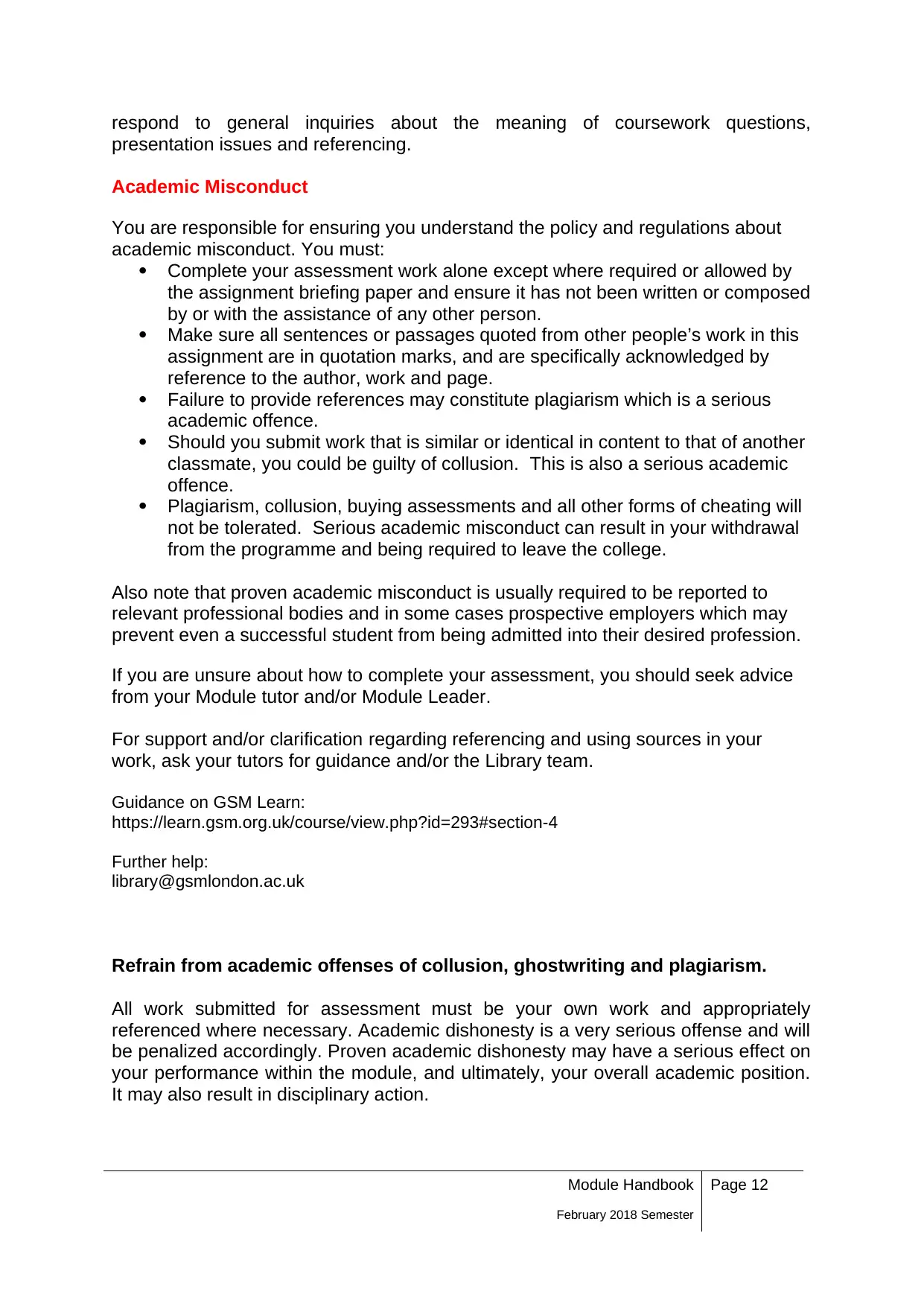
respond to general inquiries about the meaning of coursework questions,
presentation issues and referencing.
Academic Misconduct
You are responsible for ensuring you understand the policy and regulations about
academic misconduct. You must:
Complete your assessment work alone except where required or allowed by
the assignment briefing paper and ensure it has not been written or composed
by or with the assistance of any other person.
Make sure all sentences or passages quoted from other people’s work in this
assignment are in quotation marks, and are specifically acknowledged by
reference to the author, work and page.
Failure to provide references may constitute plagiarism which is a serious
academic offence.
Should you submit work that is similar or identical in content to that of another
classmate, you could be guilty of collusion. This is also a serious academic
offence.
Plagiarism, collusion, buying assessments and all other forms of cheating will
not be tolerated. Serious academic misconduct can result in your withdrawal
from the programme and being required to leave the college.
Also note that proven academic misconduct is usually required to be reported to
relevant professional bodies and in some cases prospective employers which may
prevent even a successful student from being admitted into their desired profession.
If you are unsure about how to complete your assessment, you should seek advice
from your Module tutor and/or Module Leader.
For support and/or clarification regarding referencing and using sources in your
work, ask your tutors for guidance and/or the Library team.
Guidance on GSM Learn:
https://learn.gsm.org.uk/course/view.php?id=293#section-4
Further help:
library@gsmlondon.ac.uk
Refrain from academic offenses of collusion, ghostwriting and plagiarism.
All work submitted for assessment must be your own work and appropriately
referenced where necessary. Academic dishonesty is a very serious offense and will
be penalized accordingly. Proven academic dishonesty may have a serious effect on
your performance within the module, and ultimately, your overall academic position.
It may also result in disciplinary action.
Module Handbook Page 12
February 2018 Semester
presentation issues and referencing.
Academic Misconduct
You are responsible for ensuring you understand the policy and regulations about
academic misconduct. You must:
Complete your assessment work alone except where required or allowed by
the assignment briefing paper and ensure it has not been written or composed
by or with the assistance of any other person.
Make sure all sentences or passages quoted from other people’s work in this
assignment are in quotation marks, and are specifically acknowledged by
reference to the author, work and page.
Failure to provide references may constitute plagiarism which is a serious
academic offence.
Should you submit work that is similar or identical in content to that of another
classmate, you could be guilty of collusion. This is also a serious academic
offence.
Plagiarism, collusion, buying assessments and all other forms of cheating will
not be tolerated. Serious academic misconduct can result in your withdrawal
from the programme and being required to leave the college.
Also note that proven academic misconduct is usually required to be reported to
relevant professional bodies and in some cases prospective employers which may
prevent even a successful student from being admitted into their desired profession.
If you are unsure about how to complete your assessment, you should seek advice
from your Module tutor and/or Module Leader.
For support and/or clarification regarding referencing and using sources in your
work, ask your tutors for guidance and/or the Library team.
Guidance on GSM Learn:
https://learn.gsm.org.uk/course/view.php?id=293#section-4
Further help:
library@gsmlondon.ac.uk
Refrain from academic offenses of collusion, ghostwriting and plagiarism.
All work submitted for assessment must be your own work and appropriately
referenced where necessary. Academic dishonesty is a very serious offense and will
be penalized accordingly. Proven academic dishonesty may have a serious effect on
your performance within the module, and ultimately, your overall academic position.
It may also result in disciplinary action.
Module Handbook Page 12
February 2018 Semester
⊘ This is a preview!⊘
Do you want full access?
Subscribe today to unlock all pages.

Trusted by 1+ million students worldwide
1 out of 20
Related Documents
Your All-in-One AI-Powered Toolkit for Academic Success.
+13062052269
info@desklib.com
Available 24*7 on WhatsApp / Email
![[object Object]](/_next/static/media/star-bottom.7253800d.svg)
Unlock your academic potential
Copyright © 2020–2026 A2Z Services. All Rights Reserved. Developed and managed by ZUCOL.





